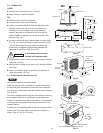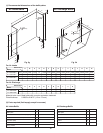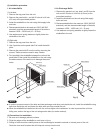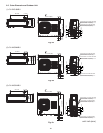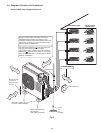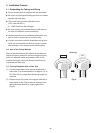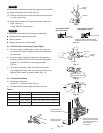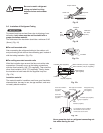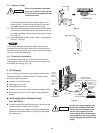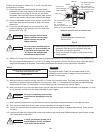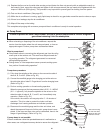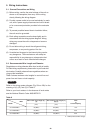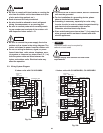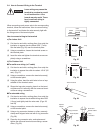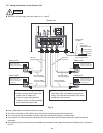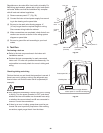
19
4. Air Purging
Air and moisture remaining in the refrigerant system have
undesirable effects as indicated below. Therefore, they
must be purged completely.
pressure in the system rises
operating current rises
cooling efficiency drops
moisture in the air may freeze and block capillary tubing
water may lead to corrosion of parts in the refrigerant
system
Air Purging with a Vacuum Pump
(for Test Run)
In order to protect the earth’s environment, be sure to use
a vacuum pump to perform the air purge.
(Never perform an air purge by using the refrigerant gas
cylinder or other external gas, or by using the gas inside
the outdoor unit.)
Fig. 20
CAUTION
In order to prevent charging errors
with the air conditioner that uses
R410A, the screw diameter at the
service valve charging port has
been changed. When recharging or
performing other servicing, use the
special charging hose and manifold
gauge.
Service
valve on
wide tube
side
Service
valve on
narrow
tube side
A
B
C
D
Vacuum
pump
Vacuum pump
adapter
(for preventing
reverse flow)
(special for
R410A)
High-pressure valve
Manifold gauge
(special for R410A)
Low-pressure
valve
Leave the
valve open.
Open
Charging hose
(special for R410A)
Hex wrench
With push-pin
HiLo
3-7. Taping the Tubes
(1) At this time, the 2 refrigerant tubes (and electrical wire
if local codes permit) should be taped together with
armoring tape. The drain hose may also be included
and taped together as 1 bundle with the tubing.
(2) Wrap the armoring tape from the bottom of the outdoor
unit to the top of the tubing where it enters the wall. As
you wrap the tubing, overlap half of each previous tape
turn. (Fig. 18)
(3) Clamp the tubing bundle to wall, using 1 clamp approx.
every 47" (120 cm).
Do not wind the armoring tape too tightly, since this will
decrease the heat insulation effect. Also, be sure the con-
densation drain hose splits away from the bundle and drips
clear of the unit and the tubing.
3-8. Finishing the Installation
After finishing insulating and taping over the tubing, use
sealing putty to seal off the hole in the wall to prevent rain
and draft from entering. (Fig. 19)
NOTE
Fig. 18
Clamp
Insulated tubes
Apply putty here
Tubing
Fig. 19
CAUTION
After a tube has been insulated,
never try to bend it into a narrow
curve, as this may cause the tube
to break or crack.



